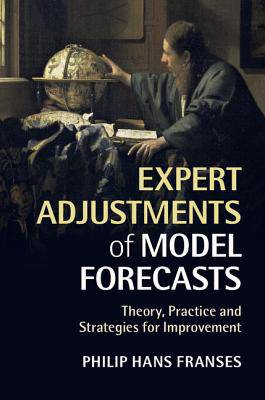
Bedankt voor het vertrouwen het afgelopen jaar! Om jou te bedanken bieden we GRATIS verzending (in België) aan op alles gedurende de hele maand januari.
- Afhalen na 1 uur in een winkel met voorraad
- In januari gratis thuislevering in België
- Ruim aanbod met 7 miljoen producten
Bedankt voor het vertrouwen het afgelopen jaar! Om jou te bedanken bieden we GRATIS verzending (in België) aan op alles gedurende de hele maand januari.
- Afhalen na 1 uur in een winkel met voorraad
- In januari gratis thuislevering in België
- Ruim aanbod met 7 miljoen producten
Zoeken
Expert Adjustments of Model Forecasts
Theory, Practice and Strategies for Improvement
Philip Hans Franses
Hardcover | Engels
€ 112,45
+ 224 punten
Uitvoering
Omschrijving
To what extent should anybody who has to make model forecasts generated from detailed data analysis adjust their forecasts based on their own intuition? In this book, Philip Hans Franses, one of Europe's leading econometricians, presents the notion that many publicly available forecasts have experienced an 'expert's touch', and questions whether this type of intervention is useful and if a lighter adjustment would be more beneficial. Covering an extensive research area, this accessible book brings together current theoretical insights and new empirical results to examine expert adjustment from an econometric perspective. The author's analysis is based on a range of real forecasts and the datasets upon which the forecasters relied. The various motivations behind experts' modifications are considered, and guidelines for creating more useful and reliable adjusted forecasts are suggested. This book will appeal to academics and practitioners with an interest in forecasting methodology.
Specificaties
Betrokkenen
- Auteur(s):
- Uitgeverij:
Inhoud
- Aantal bladzijden:
- 144
- Taal:
- Engels
Eigenschappen
- Productcode (EAN):
- 9781107081598
- Verschijningsdatum:
- 9/10/2014
- Uitvoering:
- Hardcover
- Formaat:
- Genaaid
- Afmetingen:
- 152 mm x 229 mm
- Gewicht:
- 317 g

Alleen bij Standaard Boekhandel
+ 224 punten op je klantenkaart van Standaard Boekhandel
Beoordelingen
We publiceren alleen reviews die voldoen aan de voorwaarden voor reviews. Bekijk onze voorwaarden voor reviews.









